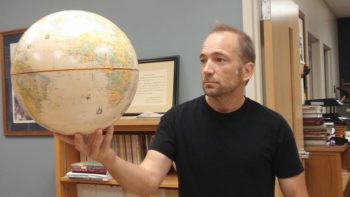
Lullabyebye
Contributor’s Marginalia: John Gallaher on “Lullaby, with Bough-Break” by Bruce Beasley
Lullabyebye
for Bruce Beasley
As I’m reading this poem by Bruce Beasley, I’m getting that woozy
feeling I get and then forget and then get again, like the recurring need
to go to church or see the Grand Canyon. At some point you stop
talking about your children. Those children are no more. Oh
unhappy livingness. Or at least you stop talking about them
as children until they visit with new loves or children of their own
so all the child stories can trot back out, as a kind of consolation,
but there is no consolation. Is that how it goes? I haven’t gotten
there yet, as my children are still here, in school, needing lunches
and rides, so I don’t know for sure, but that’s how I imagine it.
So you break a little thinking about it, or I do, how Eliot just said
to me, looking at some puppy pictures on the humane society
facebook page, that when he looks at a picture of a puppy he dies
and then comes back to life. “When I look at you,” I imagine myself
saying, I imagine all of us saying, “I die and come back to life, I die
and come back to more life as I die and part of me stays dead.”
It’s like that “I love you to the moon and back” book we’d read
back there in the other room, that room which is still there, right
there, seriously, literally, right there, I’m looking at it. So why aren’t
we in it? All houses are like that, all misaligned walls and chatty ghosts.
Here’s your prompt, then: imagine an aubade in a world without
beginnings or endings. It’s a creative writing exercise, or a life exercise,
how anything is a form unto itself, and can be talked about in that way,
that one-off, extemporaneous solo that we decide later to transcribe,
it’s that good, but at the time whoever, John Coltrane maybe,
was just blowing what the day presents. Who knows what he
was thinking about. By the end, he was saying that 90% of what
he played was prayer, and now I’m just starting to get that. I come
to things slow, and I break a lot while trying to roll with it, thinking,
yeah, I’m flexible, flexible as glass. So I get it, as I’m reading this poem
by Bruce Beasley, a word jumble of nursery rhyme panic and attempts
at distance as a kind of closeness to Jin, turning eighteen. And what
does Jin say, getting this birthday gift? I read that Fergus wasn’t much
for his father’s poems, Fergus, who rose above the age. So I ask
Eliot what he’s going to think of this poem someday, and he shrugs,
and asks if there’s any money in it. Apologies, Western Canon.
Excuse me, emotion recollected in tranquility, but it’s 2038 now,
and Eliot and Jin are 32 and 38. Or else it’s 2048, and they’re
42 and 48. It’s easy math. Like sun going up and sun going down.
